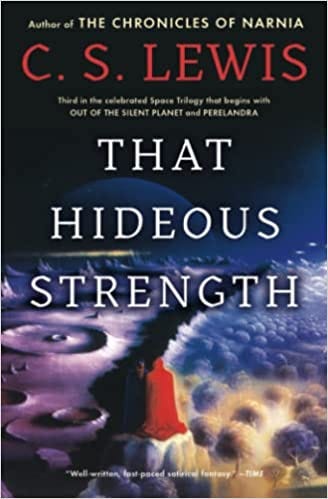
View
That Hideous Strength (1945) is the title of C. S. Lewis’ third installment in his (underrated) Space Trilogy. He called it a modern fairy-tale for grown-ups. Lewis took the title phrase from a medieval poem written by David Lyndsay, speaking of The Tower of Babel: “The shadow of that hyddeous strength, sax myle and more it is of length.” The story of Babel plays an unexpected part in Lewis’ story.
In Genesis 11, the tower represented the advancement of power and strength and human achievement, but also of human control of their affairs. Building the tower to the heavens, in the biblical account, would demonstrate that these humans (in their own estimation) could do anything. They could control their affairs, sharing a common language, nothing (in their estimation) would be beyond them. They would be independent. God then scatters them by distributing different languages among them. This essentially divided the people, frustrating their ability to coordinate and leading to the dispersion of humanity across the globe.
Interpreting the story has led various interpreters in various directions. (As an aside, that is an ever-present challenge with the interpretation of the narrative parts of the Bible, they aren’t always fully explained - they are just … narrated.) It seems clear to most interpreters that building the city and the tower was an act of independence from God, a demonstration that they can do all they need on their own, a statement that reliance on God is unnecessary, and in conflict with God's command to spread over all the earth. It was, by most accounts, a rebellion against the reality of human fallenness and limitation and against our corresponding need to rely on God. At the same time, it probably was an impressive tower. It probably led those people to think that nothing was beyond their collective power. Which, it turns out, isn’t true.

I don’t think the Tower of Babel gets its due. I mean the story of the Tower of Babel, not the tower itself - whatever and wherever that was. One way to think about the times we are in is to picture hundreds of symbolic Towers of Babel being built amid much false certainty, confident proclamations, and hubris while hundreds of others are being quietly abandoned in unacknowledged or quickly forgotten disappointment. The League of Nations came out of the shattered post-World War I disorder and promised to bring the world together in peace and understanding. Hitler rolled into Poland twenty years later to officially get World War II and the Holocaust started. It is easy to look at the Cold War, the Gulags, the Killing Fields, Vietnam, stagflation, Iraq, Afghanistan, 9/11, the crash and great recession of 2008, the pandemic, and many other episodes as failures we have learned something from - even if we don’t agree on what we have learned. But we consistently forget (or ignore) that each was preceded by false certainty, confident proclamations, and hubris. We fail to remember our limitation, our fallenness, and our dependence on God.
One way to think about the times we are in is to picture hundreds of symbolic Towers of Babel being built amid much false certainty, confident proclamations, and hubris while hundreds of others are being quietly abandoned in unacknowledged or quickly forgotten disappointment.
I remember the promise of the internet in general and social media in particular - who, of those of us old enough, doesn’t? Let’s bring all the people of the world together so they can be in constant communication. Let’s make everything available to everyone all the time. Let’s wire everyone up all over the world. Let’s connect everyone to everyone else (all the time). What could go wrong? During the pandemic, Bo Burnham gave us his take on the promise and the darkness of the online world in his sunny little ditty “Welcome to the Internet”. (Editor’s note: It isn’t sunny.)
Welcome to the internet / Have a look around
Anything that brain of yours can think of can be found
We've got mountains of content / Some better, some worse
If none of it's of interest to you, you'd be the first
Welcome to the internet / Come and take a seat
Would you like to see the news / Or any famous women's feet
… (skipping ahead to the end because this is a family Dispatch)
[*laughing hysterically*]
Could I interest you in everything / All of the time
A bit of everything / All of the time
Apathy's a tragedy / And boredom is a crime
Anything and everything / All of the time
Could I interest you in everything / All of the time
A little bit of everything / All of the time
Apathy's a tragedy / And boredom is a crime
Anything and everything / And anything and everything
And anything and everything / And all of the time
Bo Burnham - Inside - Netflix (https://www.lyricsondemand.com/b/boburnhamlyrics/insidethesongsalbumlyrics.html#welcometotheinternetlyrics)
Having unlimited ability to connect and learn and communicate, we divide and ignore and condemn. We damage and are damaged. It is Babel of sorts - we, in our fallenness, turn unlimited communication into an inspiration for a Bo Burnham song.
What could go wrong? We could go wrong. Like every other time.
In Lewis’ book, the ultimate expression of human power is represented by or is being enacted by a group of governmentally connected scientists called the National Institute for Coordinated Experiments - helpfully shortened to NICE. Near the end of the book (and the trilogy), a triumphant NICE banquet ends in an apocalyptic Tower of Babel re-enactment of sorts. Lewis is saying (also not a sunny view) that it isn’t us at our least civilized and least educated and least coordinated where we go most wrong. It is when we, in our education and organization and coordination, forget that the problems aren’t “out there” somewhere - that we are always at least a part of what goes wrong. And, forgetting that, much can go wrong. The list of 20th and 21st century failures above came from us (at least partly) at our most educated and organized and coordinated.
What it is that can and does go wrong isn’t, therefore, fixed with more education and more information and coordination and regulation - as necessary as those things are. I heartily acknowledge our need for education and information. I wrote in my last dispatch about my participation in a training conference for village leaders in Nepal. I admire and recognize the benefits of advancing technology, scientific breakthroughs, governmental efficiency, and agreements between nations. Our needs just run a bit deeper than that.
This is where, I think, the central truth of the Tower of Babel account can be found. That Hideous Strength uses the Tower of Babel imagery at the end of the story, as a judgment. In Genesis 11 we see, under the surface, as it is under the surface of most of the stories of the Bible, grace. We are intended to live in dependence on God, in the full knowledge of our need of Him even as we advance in knowledge. God doesn’t oppose our personal or collective advancement or the growth in human knowledge or new technology. He just knows that, in advancement or decline, we need Him. And it is His grace that reminds us of that need.
Jesus said,
Come to me, all you who are weary and burdened, and I will give you rest. Take my yoke upon you and learn from me, for I am gentle and humble in heart, and you will find rest for your souls. For my yoke is easy and my burden is light.”
(Matthew 11:28-30)
It is God’s grace to frustrate our attempts to live without Him.
It is God’s grace to remind us that we need Him.
It is God’s grace to be there for us when we admit that things have gone wrong or that we have gone wrong - and that this will, inevitably, happen again.
His yoke is easy and His burden is light. He is gentle and humble in heart and we will find rest for our souls.
Links
A good review of That Hideous Strength from the online magazine for science fiction and fantasy - tor.com
If you are interested in reading That Hideous Strength - I really recommend the trilogy.




